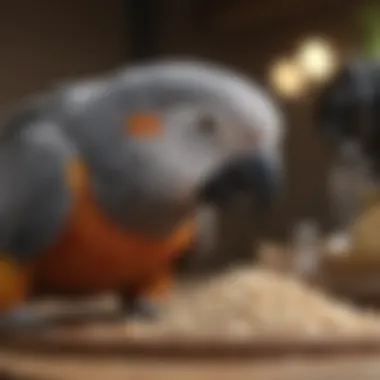Calcium Supplements for African Grey Parrots: Needs & Benefits


Intro
Calcium plays a critical role in the overall health of African Grey parrots. These intelligent birds require a balanced diet that meets their specific nutritional needs to thrive. Calcium is essential not just for strong bones and teeth but also for vital physiological processes such as nerve function and muscle contraction. Deficiencies in calcium can lead to significant health issues, and understanding how to provide adequate supplements can greatly enhance your pet's well-being. In this article, we will explore the diverse world of calcium supplements tailored for African Grey parrots, focusing on their unique needs and the benefits that come with proper supplementation.
Understanding Your Pet
To care for an African Grey parrot effectively, it’s important to comprehend their behavior, breed characteristics, and specific dietary needs. This understanding lays the foundation for better health and nutrition choices.
Pet Behavior Basics
African Grey parrots are known for their remarkable intelligence and ability to mimic sounds. They are social creatures, usually expressing their emotions and preferences through vocalizations and body language. Understanding these behaviors is vital for facilitating a harmonious relationship between the bird and its owner. Recognizing stress cues or signs of boredom can prompt timely intervention, ensuring that the bird remains mentally stimulated and emotionally content.
Common Breed Characteristics
The African Grey parrot is a medium-sized bird that usually measures between 12 to 14 inches in length. Their plumage is predominantly grey, accented with red under the tail feathers. These birds have strong beaks, necessary for cracking seeds and nuts. Their lively and curious nature makes them delightful companions, but it also means they require stimulating environments.
Species-Specific Needs
Due to their unique metabolism, African Grey parrots require more calcium compared to other parrots. This makes it essential for owners to prioritize calcium intake through diet and supplementation. A lack of calcium can lead to problems such as bone density loss and egg binding in females. Therefore, understanding how to meet these specific needs is crucial for anyone wishing to keep an African Grey healthy.
Nutritional Requirements
Essential Nutrients
In addition to calcium, a well-rounded diet for an African Grey should include protein, vitamins, and fats. It’s vital to provide a mix of pellets, fresh fruits, and vegetables. A diet that is too high in seeds can lead to nutritional deficiencies, making supplementation necessary.
The Role of Calcium
Calcium contributes significantly to various biological functions. It aids in blood coagulation and muscle contraction, as well as ensuring the structural integrity of bones. African Greys need calcium daily, and understanding how to provide this through their diet and supplements allows owners to avoid serious health problems.
Types of Supplements Available
There are several options to consider when looking for calcium supplements for your African Grey. These include:
- Calcium Carbonate: A common and inexpensive option.
- Calcium Citrate: More easily absorbed but often more costly.
- Liquid Calcium: Convenient to mix with food or water.
- Calcium-Rich Treats: Specially formulated snacks that enhance calcium intake.
When selecting a supplement, consider both the form and the quality. Always choose reputable brands to ensure the safety and efficacy of the products.
Practical Advice for Supplementation
To assess dietary needs effectively:
- Consult a Veterinarian: Regular check-ups can help determine any deficiencies.
- Monitor Behavior and Health: Changes in behavior may indicate nutritional issues.
- Gradual Introduction: When incorporating supplements, do so gradually to prevent digestive upset.
By continuously observing your African Grey, you can tailor their calcium intake and ensure it meets their evolving needs.
The End
Intro to Calcium Supplementation
Calcium supplementation for African Grey parrots is a subject of considerable importance. These birds have specific nutritional needs that demand attention to detail. Inadequate calcium intake can lead to health complications. Knowing how to address these needs can enhance the well-being of African Grey parrots.
Importance of Calcium for Birds
Calcium plays a vital role in the maintenance of birds' overall health. It is crucial for various bodily functions. For instance, it aids in bone formation, muscle contraction, and blood clotting. Birds often require higher calcium levels than usual when they are breeding or laying eggs. Without sufficient calcium, they can suffer from weakened bones and a host of other health issues. African Grey parrots require a consistent and balanced intake of this mineral to ensure they thrive.
Nutritional Needs of African Grey Parrots
Understanding the nutritional needs of African Grey parrots involves more than just understanding calcium. These parrots have a varied diet. They need a balance of seeds, fruits, vegetables, and nuts. Each food group contributes to their overall health. While calcium is essential, it must be included in a diverse diet that meets their energy, vitamins, and minerals needs.


Female African Greys, especially those that are breeding, have higher calcium needs during reproductive periods. Hence, supplementing their diet can be necessary. By comprehending these needs, pet owners can ensure their birds receive an appropriate amount of calcium and overall nutrition.
Proper understanding of nutritional needs can make the difference between a healthy bird and one that suffers from deficiencies.
Understanding Calcium Deficiency
Calcium deficiency is a significant concern in the health of African Grey parrots. Adequate calcium is not just a dietary need; it plays a fundamental role in many biological processes in birds. Understanding how a lack of calcium affects African Grey parrots can provide insight into their dietary requirements and help prevent potential health issues. Key elements of this understanding include recognizing symptoms, the long-term impacts on health, and the critical role calcium plays in their overall well-being.
Symptoms of Calcium Deficiency in African Grey Parrots
Identifying symptoms of calcium deficiency early can make a substantial difference. African Grey parrots may display various signs, and being attentive to these can aid in timely intervention. The following are common symptoms to note:
- Weak bones: Birds may exhibit difficulty in movement or unusual sitting postures.
- Muscle tremors: Spasms can occur due to impaired muscle function.
- Soft-shelled eggs: Female parrots might lay eggs with weak shells, leading to complications.
- Behavioral changes: Increased aggression or lethargy can be observed.
It is important to monitor the health of your parrot closely and consult a veterinarian if any of these symptoms appear.
Long-term Health Risks
The long-term health risks associated with calcium deficiency in African Grey parrots are alarming. Prolonged deficiencies can lead to severe complications, including:
- Bone fractures: Weak bones increase the risk of fractures, which can severely affect mobility.
- Osteoporosis: This condition results in brittle and fragile bones, leading to pain and discomfort.
- Inadequate immune function: Calcium plays a role in physiological processes that support a healthy immune system.
- Reproductive issues: Ongoing deficiency can cause complications in breeding, affecting both male and female parrots.
Adequate calcium intake is essential not only for immediate symptoms but also for preventing these serious long-term health risks. It is crucial that parrot owners educate themselves on how to provide a balanced diet to avoid these complications.
Types of Calcium Supplements Available
Understanding the types of calcium supplements available for African Grey parrots is crucial for ensuring their health and wellbeing. Calcium is not just a mineral; it plays a pivotal role in multiple bodily functions. Birds, especially African Greys, often have a higher requirement for calcium compared to other pets. Therefore, choosing the right type of calcium supplement is fundamental to meeting their nutritional needs.
Calcium Carbonate vs.
Calcium Citrate
Both calcium carbonate and calcium citrate are common forms of calcium supplements. Calcium carbonate is one of the most widely used supplements. It contains a high percentage of elemental calcium, making it a cost-effective option. However, it requires stomach acid for absorption, which may not be as effective for older birds or those with digestive issues. On the other hand, calcium citrate is more easily absorbed regardless of stomach acidity. This makes it a suitable alternative for parrots with compromised digestive systems. While calcium citrate may be more expensive, the improved bioavailability could justify the cost for some owners.
Factors to Consider
- Digestibility: Choose a supplement that your parrot can easily absorb for maximum health benefits.
- Cost: Determine your budget as some options, like calcium citrate, can be pricier.
- Veterinary Guidance: Consult a veterinarian to understand which form may work best for your parrot’s specific needs.
Organic vs.
Synthetic Supplements
The choice between organic and synthetic calcium supplements is another important aspect. Organic supplements include natural sources of calcium such as powdered egg shells or cuttlebone. These options are often rich in other minerals and nutrients beneficial for African Grey parrots. Conversely, synthetic supplements are manufactured and may contain added vitamins and minerals. They often come in specific dosage forms and can be easier to measure and administer.
Pros and Cons
- Organic Supplements:
- Synthetic Supplements:
- Pros: Natural, contains additional nutrients, often well-received by birds.
- Cons: Variability in calcium content, requires proper preparation and storage.
- Pros: Consistent dosages, easily available in stores.
- Cons: Can contain fillers and additives that some owners might want to avoid.
Ultimately, the choice between organic and synthetic supplements should depend on the specific dietary needs of your parrot, as well as personal preferences regarding natural versus manufactured products.
Evaluating Your Parrot's Diet
Evaluating the diet of an African Grey parrot is essential for their overall health and well-being. This section aims to emphasize the significance of understanding the key dietary components and the role fresh foods play. Proper evaluation enables owners to tailor their parrot's diet effectively, ensuring that it meets specific nutritional needs. A balanced diet is vital to prevent deficiencies and promote optimal health.
Key Dietary Components for African Grey Parrots


African Grey parrots require a varied diet to thrive. The key components of their diet include:
- Pelleted Food: High-quality pelleted diets provide a balanced intake of vitamins, minerals, and amino acids. Selecting the right brand ensures they receive essential nutrients.
- Seeds and Nuts: While not the main component, seeds and nuts add crucial fats and protein. Moderation is vital, as too many can lead to obesity.
- Fresh Fruits and Vegetables: These are rich in vitamins and minerals. Aim to include items like bell peppers, leafy greens, and berries. Variety maintains interest and encourages healthy eating.
- Grains and Legumes: Cooked whole grains and legumes offer additional proteins and energy. Brown rice and lentils are good choices.
Understanding these dietary components and their respective contributions helps in constructing a balanced diet. It is vital to adjust the proportions of each to align with the parrot's age, activity level, and health status.
Understanding the Role of Fresh Foods
Fresh foods are a cornerstone of a well-rounded diet for African Grey parrots. Fresh fruits and vegetables provide essential hydration and nutrients that commercial diets sometimes lack. They also encourage natural foraging behaviors, which is important for mental stimulation. Some notable benefits include:
- Nutrient Density: Fresh produce often contains higher levels of vitamins such as Vitamin C and A, which are crucial for immune function and overall health.
- Hydration: Many fruits and vegetables have high water content, which aids in hydration, especially in warmer climates.
- Palatability: Fresh foods can entice picky eaters. Introducing new types of produce can be beneficial in diversifying their diet, making it more enjoyable.
Incorporating fresh foods into the daily routine of an African Grey not only enhances their diet but also promotes their mental health.
When introducing fresh foods, do so gradually to monitor reactions and preferences. Always wash produce thoroughly and remove any pesticide residues before feeding. Avoid highly processed items, as they may contain additives that are harmful to birds.
In summary, evaluating your parrot's diet involves a careful balance of commercial and fresh foods that cater to their unique needs. A thoughtful approach in feeding practices assures that an African Grey parrot remains healthy and happy.
How to Supplement Calcium Properly
Supplementing calcium for African Grey parrots is a focus that requires careful attention. These birds can have specific needs that vary by age, diet and health status. Correct supplementation can help mitigate calcium deficiencies, which can lead to severe health problems. This part of the article provides practical guidance for parrot owners on how to ensure their birds receive the right amount of calcium through supplementation.
Identifying the Proper Dosage
Determining the correct dosage of calcium is essential for the health of African Grey parrots. Too much calcium can lead to hypercalcemia, whereas too little can contribute to deficiencies. General guidelines suggest that adult African Grey parrots may require around 1,000 to 3,000 mg of calcium per kilogram of body weight daily. However, the exact amount can depend on individual factors.
To identify the right dosage for your parrot, consider the following steps:
- Consult a Veterinarian: Engaging with an avian vet helps create a tailored plan for your parrot's needs.
- Evaluate Current Diet: Review the dietary intake of your parrot. If they consume a lot of leafy greens or specific seeds, they might require less supplementation.
- Monitor Health: Keep an eye on any signs of calcium deficiency or health issues. Adjust dosages accordingly based on symptoms or medical advice.
A careful approach to dosage ensures better health outcomes for African Grey parrots and ultimately improves their quality of life.
Integrating Supplements into Their Diet
Incorporating calcium supplements into an African Grey parrot's diet is an important process. The goal is to blend supplements seamlessly with regular food to prevent any aversion.
Here are some strategies to achieve effective integration:
- Choose the Right Form: Calcium supplements come in various forms, such as powder, chewable tablets, or liquids. Selecting the form that best fits your bird's feeding habits might help with compliance.
- Mix with Favorites: Mix the supplement with foods your parrot enjoys. For instance, combining powder with fresh fruits or veggies they prefer can make the supplement less noticeable.
- Regular Schedule: Develop a consistent routine for administering the supplement. This promotes regular intake and can help avoid confusion about mealtime.
- Monitor Reactions: Observe your parrot's response to the supplement. If they show any signs of dislike, try introducing the supplement in a different way.
Ultimately, the goal is to provide calcium that fits well into their diet without causing stress or discomfort, promoting a well-rounded approach to health management.
Monitoring Your Parrot's Health
Monitoring your African Grey parrot's health is an essential aspect of ensuring their well-being. These intelligent birds are sensitive creatures. Paying attention to their health can prevent serious issues from developing. This section focuses on two key components: regular veterinary check-ups and recognizing signs of improvement or decline in health. Both play a crucial role in maintaining a balanced and healthy lifestyle for your parrot.
Regular Veterinary Check-ups
Regular veterinary check-ups are vital for African Grey parrots. These visits can help detect health problems before they escalate. A veterinarian can observe your parrot's overall condition, weight, and plumage. They can also offer tailored advice based on your bird's nutritional needs, specifically calcium supplementation, which is important for bone health.
The general recommendation is to schedule check-ups at least once a year. Older birds or those with existing health issues may need more frequent visits. During these appointments, the vet may perform a thorough examination, blood tests, and other necessary diagnostics. Keeping a close watch on your parrot's health can significantly enhance their life expectancy and quality of life.
“Proactive care is key. Regular visits to the veterinarian will identify potential issues early.”
Signs of Improvement or Decline
As a parrot owner, understanding signs of health is crucial. Recognizing improvements can show you that your efforts are working, while signs of decline mean you need to adjust your care.
Signs of Improvement:


- Increased Energy: Active and playful behavior suggests health gains.
- Healthy Plumage: Shiny feathers indicate proper nutrition and care.
- Consistent Eating Habits: Regular food intake shows a balanced diet.
Signs of Decline:
- Lethargy: Reduced activity can indicate illness.
- Fluffed Feathers: This may indicate discomfort or illness.
- Change in Appetite: Eating less can suggest health complications.
Observing these signs allows for timely responses. If signs of decline appear, consult your veterinarian promptly. It is a balance of care, nutrition, and observation that leads to a healthy African Grey parrot.
Common Myths about Calcium and Birds
Calcium is an essential nutrient for the health of African Grey parrots. However, various misconceptions surround its supplementation. Understanding these myths is crucial for pet owners and can significantly impact their parrots’ health and well-being. This section aims to clarify common misunderstandings regarding calcium needs, providing insight which can help in making educated decisions about your bird’s diet and health management.
Debunking Misconceptions
One prevalent myth is that all avian species have the same calcium requirements. This notion is erroneous because individual species have distinct nutritional needs. African Grey parrots are particularly susceptible to calcium deficiencies due to their unique dietary requirements. They require a higher calcium intake than many other birds. Not recognizing this can lead to poor health, weakening the bones or causing metabolic disorders.
Another widespread misconception is that all calcium sources are equally effective. For instance, while some owners may rely solely on spinach for calcium, this is misguided. Spinach contains oxalates, which can inhibit calcium absorption. Thus, it's better to diversify calcium sources by including options like cuttlebone or commercial supplements specifically designed for parrots.
A further myth is that once a parrot is older, its need for calcium diminishes. Aging does increase the risk for calcium deficiency, not reduce it. Older African Grey parrots may require additional calcium to ensure bone density and overall health.
It is critical to provide a suitable calcium intake at all life stages of African Grey parrots.
Research-Based Insights
Research indicates that misconceptions about calcium can lead to severe health implications for African Grey parrots. Studies have shown that inadequate calcium adversely affects not just the skeletal system but also the cardiovascular and nervous systems in birds.
Recent data highlights that a diet insufficient in calcium may lead not only to physical deformities but also behavioral problems like feather plucking. Animal health experts often recommend a balanced approach that includes both natural and supplemental sources of calcium.
Animal nutritionists emphasize that regular assessments of a parrot’s diet can lead to better outcomes. Keeping track of dietary changes and closely monitoring health signs help in addressing any nutritional deficiencies promptly. Furthermore, studies from reputable sources underscore the need for veterinary check-ups to tailor calcium intake according to each bird's life stage and health status.
Alternatives to Calcium Supplements
Exploring alternatives to calcium supplements is important in understanding the broader dietary needs of African Grey parrots. While supplementation can play a significant role in preventing deficiencies, certain natural sources provide adequate calcium. Recognizing these options allows for a more holistic approach to avian nutrition.
Natural Sources of Calcium
African Grey parrots can obtain calcium from various natural foods. Including these in their diet can support bone health and overall well-being.
- Leafy Greens: Foods like kale, collard greens, and dandelion greens are rich in calcium and can be incorporated easily into their diet.
- Nuts and Seeds: Almonds and sesame seeds are excellent sources of calcium. However, they should be offered in moderation due to their high fat content.
- Legumes: Cooked beans, especially black-eyed peas and chickpeas, can provide a good amount of calcium.
- Dairy Products: While not all birds digest dairy well, small amounts of yogurt or cottage cheese may offer calcium, though caution is advised regarding lactose intolerance.
- Certain Fruits: Some fruits, such as figs and oranges, contain calcium. Integrating them can enhance dietary variety.
Ensuring a balanced diet with these natural calcium sources can often reduce the reliance on supplements.
Balancing Diet without Supplements
It is possible to balance your African Grey's diet without resorting to calcium supplements. This requires careful planning and knowledge of the nutritional content of various foods.
- Diverse Food Choices: Rotating a wide range of foods helps cover calcium needs. Combining fruits, vegetables, grains, and protein sources ensures essential nutrients are available.
- Monitoring Calcium Intake: Keeping track of the foods provided can help identify if calcium needs are met. If their primary foods are rich in calcium, supplements may not be necessary.
- Adjusting Portions: Alter food portions based on your bird's activity levels and overall health. Too much emphasis on seeds or concentrated pellets should be avoided, as they may not provide sufficient calcium.
- Regular Dietary Assessments: Consulting with a veterinarian to assess dietary plans is beneficial. They can offer personalized advice based on your parrot's health condition and lifestyle.
- Observation: Keep an eye on your parrot's behavior and health. Sudden changes may indicate nutritional gaps that need addressing.
By understanding these alternatives, you can foster a healthier environment for your African Grey. Mindful dietary choices can contribute significantly to their health without depending solely on supplements.
Epilogue and Best Practices
Understanding calcium supplementation is essential for the health of African Grey parrots. This conclusion serves as an important aspect of the article, reinforcing the key takeaways regarding the nutritional needs of these birds and the role of calcium. By grasping the critical points outlined, parrot owners can better navigate the complexities of dietary supplementation.
Summary of Key Points
- Nutritional Needs: African Grey parrots require a balanced diet that includes sufficient calcium. Deficiencies may lead to serious health issues.
- Calcium Deficiency: Recognizing symptoms early can prevent long-term health risks. Awareness of signs such as lethargy and bone weakness is crucial.
- Supplement Types: There are various forms of calcium supplements available, including calcium carbonate and calcium citrate. Each has its benefits, and the choice should reflect the specific needs of the parrot.
- Monitoring Health: Regular check-ups and careful observation can ensure that the supplementation plan is effective. Parrots should be evaluated for improvements or declines in health.
- Natural Alternatives: While supplements are a valuable tool, natural sources of calcium can effectively meet dietary needs. Integrating leafy greens and certain seeds can support overall nutrition.
Final Recommendations for Parrot Owners
To optimize the health of African Grey parrots, consider the following recommendations:
- Consult with a Veterinarian: Always seek expert advice when determining the need for supplements. Each bird is unique, and professional guidance can lead to better outcomes.
- Balanced Diet: Prioritize a variety of foods that naturally contain calcium. This can help reduce reliance on supplements, promoting a more holistic approach to nutrition.
- Observe Behavior and Health: Keep an eye on your parrot's behavior, feather condition, and overall activity levels. Any changes could indicate a deficiency or the need for dietary adjustments.
- Educate Yourself: Stay informed about the nutritional requirements of African Grey parrots by reading credible sources like Wikipedia and Britannica.
Effective management of your parrot's diet and supplementation can lead to long, healthy lives for these intelligent birds.







